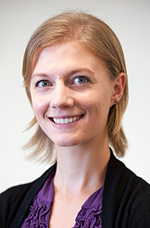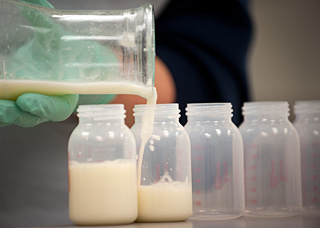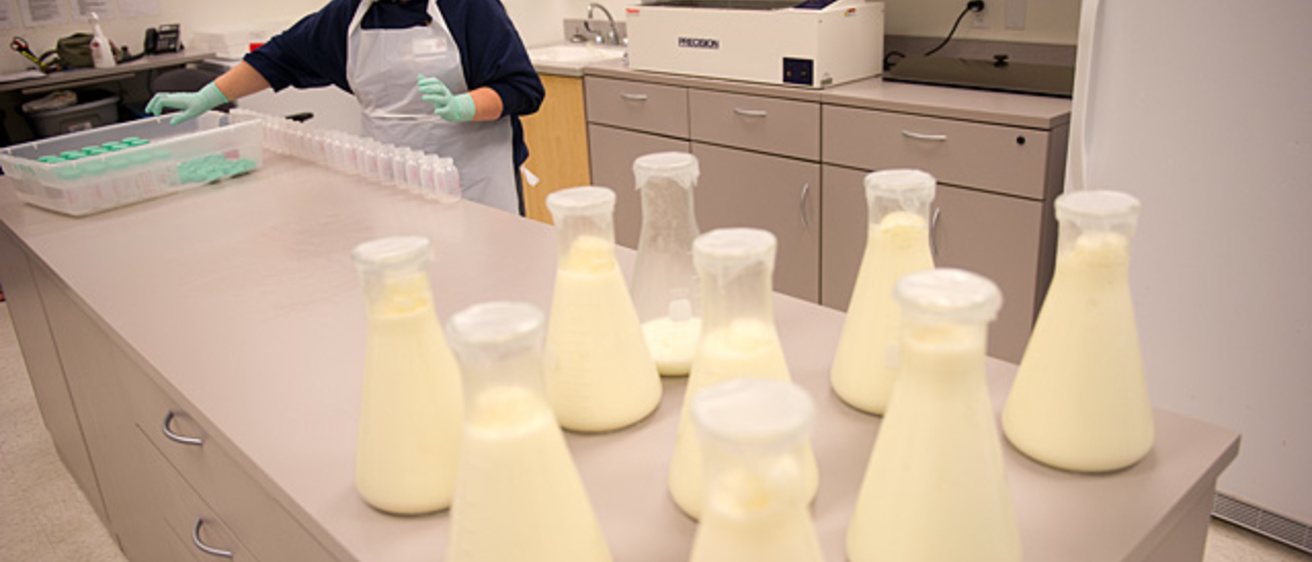Laurel Whitis, a graduate student in the University of Iowa College of Public Health, spent a good portion of the summer driving a Suburban across Iowa with a precious commodity in tow. She wasn’t transporting jewels or cash, but what many might call “white gold"—donated human breast milk to be given to premature babies and infants with special needs.

Human milk is so valuable because it contains immune system boosters and infection-fighting factors, and has unique proteins, fats, carbohydrates, and enzymes that help protect premature infants against potentially life-threatening infections.
Whitis, who is pursuing a Master’s of Public Health (M.P.H.) degree in community and behavioral health, transported the milk as part of her practicum with the Mother’s Milk Bank of Iowa. The milk bank is a nonprofit clinical service that recruits and screens milk donors, and collects, pasteurizes, stores, and dispenses donor human milk in Iowa and across the nation.
“The milk bank is a hub for the state,” Whitis says. “It establishes and manages milk collection depots, which are freezers provided by the milk bank and overseen by nursing staff or volunteers.”
Located in hospitals and other sites across Iowa, the depots provide a secure place to receive and store donor milk until milk bank staff can collect it.

“I put so many miles on the road this summer picking up milk to take back to the milk bank,” says Whitis, who ticks off Council Bluffs, Spencer, Sioux City, and Dubuque among her many stops.
A depot debut
On Sept. 26, Whitis helped celebrate the opening of a new milk collection depot at Mahaska Health Partnership in her hometown of Oskaloosa. The depot’s establishment was a major component of her practicum and brings the number of milk collection depots in Iowa to 14. The milk bank also has one location in Omaha and plans to open another depot in Manchester, Iowa, later this year.
“It’s remarkable that Laurel was able to open a milk collection depot in Oskaloosa during her M.P.H. practicum,” says Jean Drulis, director and co-founder of the Mother’s Milk Bank of Iowa.
“It will increase participation by more Oskaloosa-area milk donors," Drulis says. "It hasn’t been easy for donors in that area since the closest location for milk deliveries was Des Moines or Iowa City.”
The Mother's Milk Bank of Iowa has been growing steadily since it was founded in 2002 by Drulis and Ekhard Ziegler, within the UI Division of Pediatric Nutrition. In 2006, the milk bank program joined the Department of Food and Nutrition Services in the UI Hospitals and Clinics. Last year, the program dispensed more than 80,000 ounces (that's 625 gallons) of milk, and Drulis predicts up to a 10 percent increase in 2012.
Giving back
More than 900 women in Iowa and neighboring states have donated surplus breast milk. All donors undergo a thorough health screening before contributing, and the donated milk is pasteurized at the milk bank’s facility in Coralville, Iowa. Most immunologic and nutritional components of human milk remain intact after pasteurization.
For more information about becoming a milk bank donor or receiving donor human milk, contact the Mother’s Milk Bank of Iowa at 877-891-5347 or visit www.uichildrens.org/childrens-content.aspx?id=228055.
“The complete process takes a day in the lab,” Whitis says. “We get milk from different moms, so we want the most homogenous milk possible.”
The pasteurized milk is then frozen and stored until prescribed by a physician. The milk is used in a number of situations, including hospitalized premature infants, babies born with immunological defects, if mothers have an insufficient milk supply or are unable to nurse due to illness, or for adopted infants.
“So thankful our twins had donated breast milk in the NICU while we anxiously awaited [for my milk] to come in,” one mother recently wrote on the milk bank’s Facebook page. “Happy to announce today I have been approved to give back and will donate to the wonderful Milk Bank of Iowa. Thank you!!!!”
Whitis’ next step is writing a paper about her practicum experience and finishing her master’s degree. She plans to apply for medical school and pursue a career in family practice and obstetrics.
“My parents, grandfather, and a lot of my aunts and uncles are in the medical profession,” she says. Her internship with the milk bank provides valuable experience as she continues her family tradition in health care.
